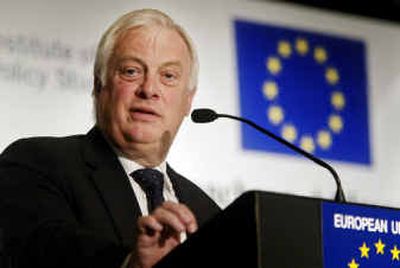Outgoing EU leaders reveal rifts

BRUSSELS, Belgium – One says admitting Turkey to the European Union would spread Islamic radicalism throughout the continent. Another calls Britain America’s slavish “spear-carrier” and bemoans Europeans’ image in Washington as “sanctimonious wimps.”
Activists? Intellectuals?
No, just the loose tongues of the outgoing European Commission. The 30 members of the EU executive are suddenly free to say what they want because of their imminent departure as a new leadership prepares to take charge Nov. 1.
In a flurry of farewell speeches, they are revealing personal opinions in unusually frank terms.
Chris Patten, the EU’s outgoing external relations chief, said Friday European Union members must share more of the burden of global leadership with Washington if they want to shed their image as “sanctimonious wimps” in the United States.
In an address to the European Policy Center, a pro-EU think tank, he chided France, Germany and Britain for forsaking their leadership of Europe.
In relations with Washington, he said, Europe “should be halfway between London and Paris: It must be neither a brave spear-carrier for the Americans, nor an elegant thrower of paper darts.”
“We can delude ourselves that we are a rival superpower. Or we could become ‘super-partners,’ ” Patten said.
As senior officials clean out their EU desks, nothing stirs a more heated debate than Turkey and its request for EU membership.
The European Commission is to say Oct. 6 if Turkey meets minimum democratic and economic criteria for membership. Turkey hopes to begin entry talks in January.
Patten said Turkey will “dramatically” change the union, but rejected the more strident views of some of his departing colleagues.
On Friday, the EU head office distanced itself from Franz Fischler of Austria, the outgoing agriculture commissioner, who reportedly told his colleagues, “There remain doubts as to Turkey’s long-term secular and democratic credentials” and suggested a “Plan B” for Turkey involving “special” rather than full membership.
The Financial Times of London said that in a nine-page letter, Fischler also cautioned “there could … be a fundamentalist backlash” if Turkey, a Muslim nation of more than 70 million people, is admitted to the union.
EU spokesman Jean Christophe Filori told reporters, “We really do not wish to comment on a letter that was internal.”
The official line at the European Union is that Ankara has done much to improve its records in human rights and economic and financial governance.
This week, Frits Bolkestein of the Netherlands – the EU’s outgoing internal market commissioner – also took issue with that.
“It’s clear that before Turkey can join, it must still undergo a transformation,” he said in a speech in The Hague.
He warned of an “implosion” of the EU and a surge of membership applications. “The EU would end up with as many as 40 member states,” including Ukraine and Belarus, two “countries that are more European” than Turkey, according to Bolkestein, but which have been told they cannot join.
EU spokesman Jonathan Todd told reporters later that Bolkestein did not mean to “prejudge” commission discussions that will take place Oct. 6.
Speaking in Ankara this week, Guenter Verheugen, the EU commissioner handling the Turkish application, said the EU “will be fair, objective and honest and will take into account the impressive progress made in Turkey.”